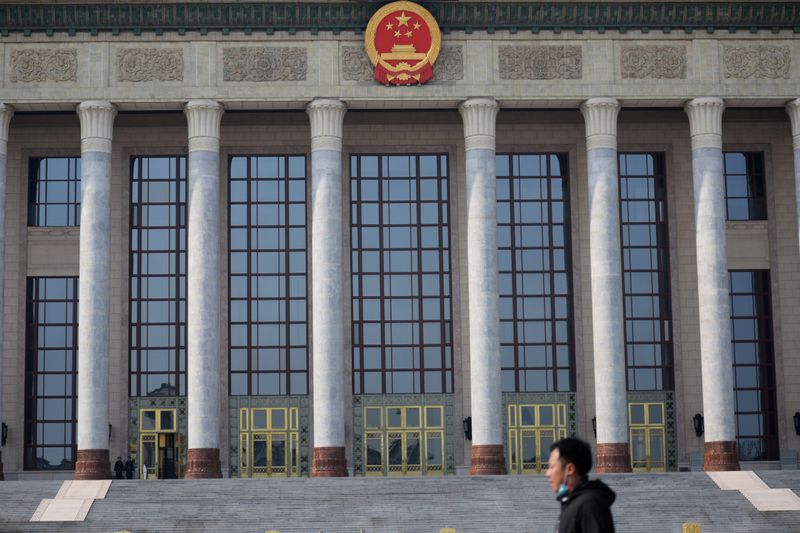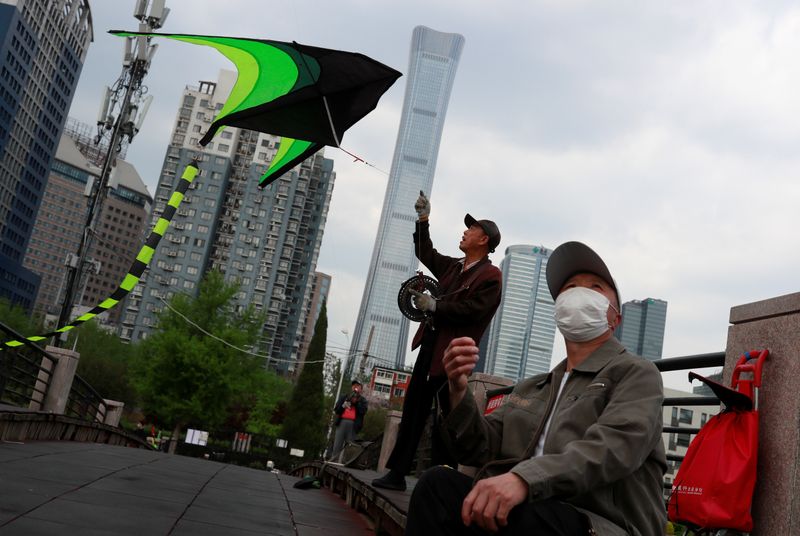BEIJING (Reuters) – The collapse in China’s economic activity caused by the coronavirus has loudened calls from top policy advisers for the government to hasten the rollout of fiscal stimulus, as ballooning unemployment threatens social stability.
Adding to the sense of urgency are growing concerns a prolonged delay in the annual meeting of parliament, originally scheduled for March 5 but postponed due to the COVID-19 outbreak, is holding up key policy measures.
Policy insiders say Beijing is preparing pro-growth steps, as worries about a long and deep economic contraction trump concerns about rising debt.
Such policies would ordinarily need legislative approval, but many argue they could be implemented ahead of the largely rubber-stamp parliament.
“We should roll out stronger fiscal policy (measures) as soon as possible,” Yu Yongding, an influential economist who previously advised the People’s Bank of China, told Reuters.
“A big package needs approval from the parliament, but we can do it through some flexible means,” Yu said. He says central bank easing is unlikely to be of much use if there is no private or public spending in the economy.
Parliament’s delay has raised concerns that China lags other major economies in rolling out a sizeable stimulus package.
No new date for parliament, known as the National People’s Congress, has been announced, though some sources say it could be held next month.
Economic targets, the budget deficit and bond issuance quotas for the year ordinarily require parliamentary approval.
China’s finance ministry and the National Development and Reform Commission, the top state planner, did not immediately respond to Reuters’ request for comment on potential stimulus.
Measures implemented so far this year include special bond issuance, virus control spending, subsidies and reduced employers’ social insurance contributions and amount to just over 2% of gross domestic product (GDP), according to Reuters analysis.
“This pales in comparison to the package the Chinese government deployed in 2009 or the packages that other countries (the U.S., Europe, etc) currently implement,” said Stefan Legge, an economist at the University of St. Gallen in Switzerland.
“Furthermore, the monetary stimulus in China is much more limited than in other parts of the world. The result is weak GDP growth in the near-term in China.”
BIG BANG?
Sources say China is set to unleash trillions of yuan in fiscal stimulus to revive the world’s second-largest economy, which could drive the budget deficit to a record high.
Senior policymakers last month said they were considering raising the budget deficit ratio. They have long kept a 3% ceiling on deficit relative to GDP.
They are also looking at issuing more local government special bonds, used largely for infrastructure projects, and what would be the first special treasury bonds since 2007, used to support firms and regions hit hard by the outbreak or for subsidies to spur consumption.
Zhang Ming, an economist at the Chinese Academy of Social Sciences – a top state think tank – expects total fiscal stimulus spending this year to be around 5 trillion yuan ($705 billion), or about 5-6% of GDP.
Liu Yuanchun, vice president of Renmin University, said a rise in the budget deficit to 3.5% of GDP from last year’s 2.8% could unleash some 1 trillion yuan.
Ting Lu, chief China economist at Nomura, said in a note that he expected Beijing to soon deliver a stimulus package worth about 10 trillion yuan, or about 10% of GDP.
MOVING TARGETS
Beijing is likely to set a GDP growth target lower than the initially planned goal of around 6%, ahead of the annual parliament meeting, policy sources have said.
But the massive economic uncertainty caused by COVID-19 has raised questions about whether China should even set a 2020 growth target at all.
China’s economy shrank 6.8% in the first quarter from a year earlier – the first such contraction on record – as tough virus containment measures halted activity.
“I think we should still set a target, although we should make an adjustment to the (original) target based on the reality,” Yao Jingyuan, an adviser to the cabinet, told Reuters.
China would need economic growth of around 5% this year to help create some 11 million new jobs, Yao said.
Zhang at the CASS said the target should be lower, at 2-3%, while Ma Jun, a central bank adviser, has called for an abolition of the target this year.
(Reporting by Kevin Yao; Editing by Tony Munroe and Sam Holmes)



















